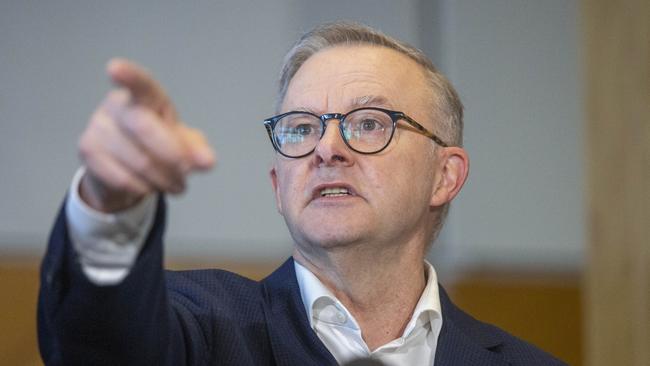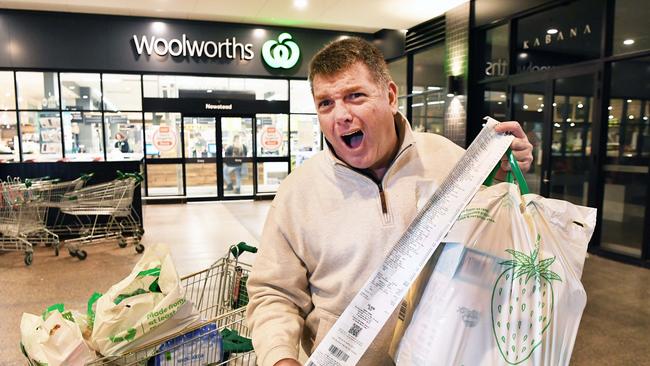When will it end? Cost of living crisis deepens as fuel hits $2.24/L
Queenslanders are being smashed by a cost of living nightmare, with Thursday’s record fuel prices adding to a long list of woes for households already battling rising interest rates, spiking energy prices and grocery shortages.
QLD News
Don't miss out on the headlines from QLD News. Followed categories will be added to My News.
Brisbane fuel prices have rocketed to their highest ever, with motorists warned to expect even more pain at the pump in the coming week.
Coles Express service stations in Chapel Hill and Rocklea, along with Freedom Fuels Indooroopilly, reached a record high price of $2.24 per litre on Thursday, surpassing the previous top figure of $2.21 in March.
The record price also comes in spite of the federal government’s temporary removal of the fuel excise tax – a cost-of-living relief measure, which was introduced at the end of March and is due to finish in late September.
A surge in fuel prices comes as households continue to face skyrocketing grocery and energy prices and just days after the Reserve Bank of Australia announced a hike to the cash rate, sending mortgage repayments climbing.
In a bid to help combat rising energy costs, Prime Minister Anthony Albanese and his new cabinet locked in new actions on Thursday, including the redesign of a trigger to halt gas exports and ensure enough supply for Australian households and businesses.

A deal between the Prime Minister and east coast gas exporters – which was due to expire on January 1 – would also be renegotiated, with Labor promising it would have a “distinctive edge” to prioritise domestic gas users.
Resources Minister Madeleine King said the existing trigger mechanism to curtail national gas exporters was a “long and complicated, convoluted, ineffective mechanism”. She said a review would be completed within weeks to retool it, with the federal government open to changing the rules so the trigger could be pulled more quickly or on the basis of price hikes rather than supply shortages.
Compare the Market spokesman Chris Ford said the current average for unleaded 91 petrol in Brisbane was sitting at $1.88, but prices across the city would climb past $2.20 within a week.
“This is a new price record since the fuel excise was cut at the end of March,” he said.
“Without this tax reprieve, we would be paying 22 cents more on top of these already extraordinary prices.”
This rising cost of fuel offers no reprieve for Brisbane households, who have already been affected by mounting cost-of-living pressures, including groceries and rent.
Mr Ford said the price surge coincided with China’s easing of Covid restrictions, which was expected to “push up demand”.
“It’s an extremely volatile market and unfortunately supply isn’t keeping pace with global needs,” he said.
“Oil prices reached a 13-week high on Wednesday – now some traders are warning prices could rise to $150 a barrel in the months ahead.
“While other fuel producing nations are increasing capacity, there are concerns it won’t be enough to cover the dearth left by Russia.
“It’s a big concern, as we know rising fuel prices impact the cost of other essential items.”
RACQ principal economic and affordability specialist Dr Ian Jeffreys said the highest fuel prices on the northside were around Kallangur, Redcliffe and Clontarff, while Rocklea, Daisy Hill and Springwood were priciest south of the river.
Despite Thursday’s record high, Dr Jeffreys said that families should brace for more price hikes.
“We’re at the very beginning of the cycle now so over the next 10 days we will see those prices go up, probably to a record high, and then slowly start to drop off over the following two or three weeks,” he said.
Dr Jeffreys said the expected price hike was being driven by international factors.
“We’re seeing a price increase all around the world, Australian fuel companies are only reacting to what is happening around the world,” he said.
Ongoing fuel hikes were also partly behind grocery prices climbing, with supermarket comparison service Frugl chief executive Sean Smith saying producers were no longer able to absorb the costs.
Even the cost of the metal for cans had soared, Mr Smith said, with labour shortages also stinging producers.
Brisbane man Josh Hall said his $65 grocery shop on Thursday night would only be enough to last him and his partner for the next day or so.
“It’s mostly just the essentials like cleaning supplies, eggs, and some veggies,” he said. “We’ve certainly noticed that everything is pretty expensive, it’s definitely gone up.”

Local shopper Brad Walker said he had stocked up at the supermarket for a boys’ weekend away, with a shop for basic items totalling $375.
“This was more of the basic stuff, but I’ve also spent another $89 at the butcher and then also $120 on seafood,” Mr Walker said.
“It’s all certainly added up – there’s only five of us for two nights, but it’s a big bill.”
Mr Walker’s wife, who did not want to be named, said she had noticed prices increasing on everyday items recently.
“Not necessarily any particular item, but just the total from each shop, it’s certainly going up,” she said.
A Coles spokeswoman said it had reduced prices on more than 2000 of its 20,000 items, but “a number of factors (are) driving inflation for all retailers, including increases in the cost of raw materials, energy price rises and freight costs”.
A Woolworths spokeswoman said the chain recently cut the price of 300 traditional winter products until August and introduced 650 own-brand products, including flour, sugar and other essentials.
“We’re working hard to manage … industry-wide inflationary pressures,” the spokeswoman said.




